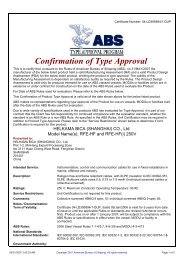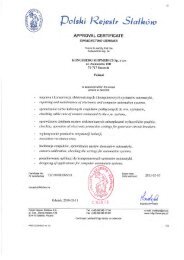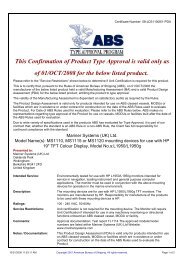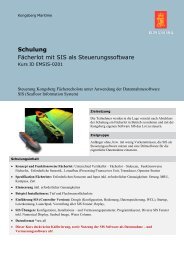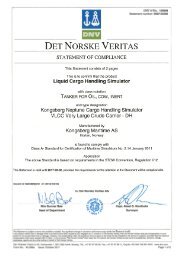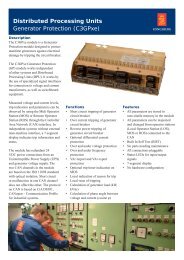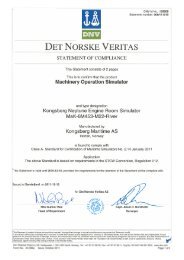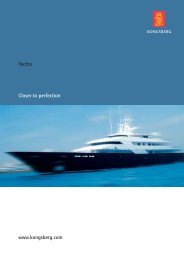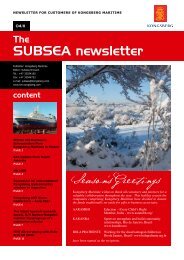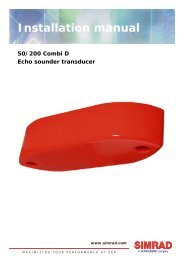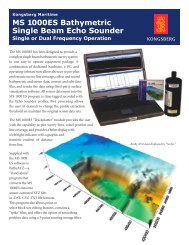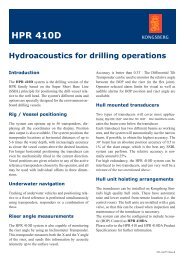Cargo and ballast simulators - Kongsberg Maritime
Cargo and ballast simulators - Kongsberg Maritime
Cargo and ballast simulators - Kongsberg Maritime
Create successful ePaper yourself
Turn your PDF publications into a flip-book with our unique Google optimized e-Paper software.
The Need for Simulators in the <strong>Maritime</strong> Industry<br />
Diff erent tasks – diff erent needs<br />
Investment in maritime <strong>simulators</strong> is no longer limited to just the<br />
largest academies <strong>and</strong> organizations. Today’s simulator customers<br />
represent a broad mix of diff erent organizations, from public training<br />
academies <strong>and</strong> universities, training centres <strong>and</strong> vocational schools,<br />
to shipping <strong>and</strong> oil & gas companies, as well as military training<br />
organizations including Navies, Coast Guards <strong>and</strong> <strong>Maritime</strong> Police.<br />
Accordingly, cargo & <strong>ballast</strong> h<strong>and</strong>ling <strong>simulators</strong> must be fl exible<br />
to meet the user’s various needs. Simulators today can be delivered<br />
tailor-made, ensuring that both functionality <strong>and</strong> cost meet the exact<br />
requirements of the user.<br />
Competence saves money & environment<br />
The importance of process underst<strong>and</strong>ing is crucial for optimum cargo<br />
<strong>and</strong> <strong>ballast</strong> h<strong>and</strong>ling. Proper simulator training is an eff ective way to<br />
build crew competence. Competent personnel work more effi ciently<br />
through reduced off -hire costs, <strong>and</strong> achieve higher productivity with<br />
lower risk of environmental damage. To avoid negative learning, it is a<br />
necessity that the simulation training is highly realistic <strong>and</strong> adaptable to<br />
real life situations. The latest maritime simulation technology provides<br />
impressive integration between cargo h<strong>and</strong>ling simulator <strong>and</strong> real vessel<br />
control systems, which gives a new level of realism, as crew can train on<br />
exactly the same equipment that they will fi nd onboard a real vessel.<br />
Educating the best personnel<br />
Compared to conventional training, <strong>simulators</strong> off er a more structured<br />
method of building high levels of competence. During simulation<br />
training, one can isolate <strong>and</strong> freeze each sub-system to underst<strong>and</strong><br />
<strong>and</strong> acquire knowledge, perform critical operations over <strong>and</strong> over<br />
again to train skills, <strong>and</strong> test <strong>and</strong> develop attitudes by training in<br />
situations that dem<strong>and</strong> complex decision making. Through the use of<br />
advanced assessment systems, simulator training can help to isolate<br />
areas requiring improvement <strong>and</strong> support the development of “tailormade”<br />
exercises. In this way, the training will focus on bringing out<br />
the best in every student.<br />
LNG membrane tank<br />
Students training on cargo h<strong>and</strong>ling <strong>simulators</strong><br />
at Kalmar <strong>Maritime</strong> Academy, Sweden<br />
Valve inspection<br />
KONGSBERG’s solution<br />
As a major world-wide supplier of ship automation <strong>and</strong> control systems, KONGSBERG has a thorough underst<strong>and</strong>ing of the industry’s<br />
training needs <strong>and</strong> detailed knowledge of the systems used onboard. We have designed our <strong>simulators</strong> around this knowledge to provide the<br />
most realistic <strong>and</strong> eff ective training possible. To meet the present <strong>and</strong> future training needs in the maritime industry, we have developed<br />
the NEPTUNE cargo & <strong>ballast</strong> h<strong>and</strong>ling simulator, which is the result of detailed studies that have defi ned the optimum solution. NEPTUNE<br />
provides high fi delity real-time simulation, supporting unique education <strong>and</strong> training of personnel. Through the use of physical models,<br />
NEPTUNE real-time simulation models are completely integrated to produce a “domino eff ect” on adjacent subsystems. Faults <strong>and</strong><br />
alarms will have cascading eff ects throughout the system if not acknowledged properly. In addition to an extremely high level of realism,<br />
the NEPTUNE cargo & <strong>ballast</strong> h<strong>and</strong>ling simulator off ers user-friendliness <strong>and</strong> fl exibility, key features for providing high levels of instructor<br />
control <strong>and</strong> greater variety of course off erings – capabilities dem<strong>and</strong>ed by shipowners <strong>and</strong> training institutes worldwide.<br />
5




